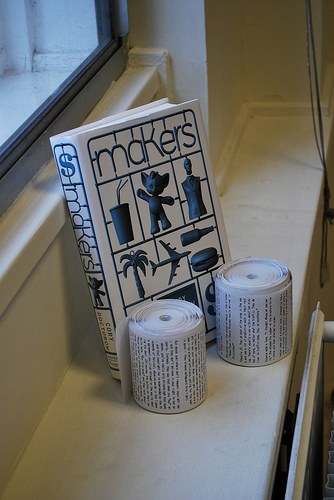“Makers”. Last night (yes, whole night) I had the pleasure of reading Cory Doctorow’s “Makers” sci-fi novel. My first novel in 14 years that I finished. Ok, I skimmed at times. But still. The great thing with inspiring novels like this is, they can create intense emotional impressions, and from reflecting on these, you learn a lot. Things you otherwise only learn by real-world experience. Here’s what I learned from “Makers”.

The “ups and downs” theme. The novel’s main theme is the ups and downs, coming and going of all social and organizational development. In my words: Every empire starts with a kingdom, a kingdom with a chief of clan, a clan with just a household and somebody wanting to dominate. In the other direction, every empire ever built has also fallen apart. Rome disintegrated within decades in the third century.
Lifecycle, applied to grassroots movements. And here came the first key insight from “Makers” for me: this full cycle also applies to grassroots social structures. That’s a disappointing insight, but a true one. The novel illustrates it in two halves: for the rising half cycle, how these “ride” parks or museums agglomerated into coops and finally got associated with Disney, plus one of their creative brains bought by Disney. And for the decaying half cycle, how the Kodacell company, starting as a huge incorporated grassroots innovation network, fell apart completely in a wink. Let’s imagine a real-world example: the Open Source movement developed its own institutions by now, and these, over the course of decades or maybe centuries, will become so rigid and cold that a new movement will justifiably fight against them, and finally render them obsolete. (For me, socialized in “old school” Linux open source culture, it’s already weird to see how the thousands of young talented Android developers at XDA Developers have a near complete disregard for licencing: their full site and wiki does not mention what licence is applied to content and code.)
So is it all just a waste of our time? At this point we could argue that all this building, fighting against and rebuilding of society structures is a waste of resources. That we should rather invest to keep our social organization ever young and flexible. Indeed, a way to use your time more efficiently, by a tight bit. What you can’t argue is that maintaining great society structures is a lot of maintenance work. Even building completely new society structures from scratch is maintenance, in the bigger picture: you replace a failing part of global social organization.
Social change activism as maintenance. So, social activism is never going to be building a great society, once and for all. It’s always part of humanity’s “eternal” struggle to keep society in good shape, if necessary rebuilding it in a completely different way. Let this point sink in: activism is not building, engineering. It is maintaining.
Activists, relax. This also means that activists can all relax a bit: the fate of the world does not depend on their proper invention and construction of society, because society will have to be rebuilt again many times in the centuries to come. This should help activists to know their fair share of maintenance work to contribute, but to also know that “more does not make it better”. The big thing, society, will fail again anyways, just like it always has, and generations afterwards will have to build it again. Sure, one generation (like after-war) has a bigger way to influence how a society is built, a bigger workload, a bigger responsibility. But even they should not forget that what they do is the necessary maintenance of a constantly deteriorating and failing organism.
There’s more to life than activism. So let’s not forget that there’s more to life than fixing the fabric of society. What? It’s also in Doctorow’s book. The two things the protagonists of “Makers” did not regret were (1) doing what they like to do, like hacking and inventing stuff, and (2) investing in good personal relationships. Because, just like society, relationships need maintenance to be and stay enjoyable: they are also subject to these ups and downs, and you see how every relationship in the book is at least once on the brink of being destroyesd, and a lot of them are.
The danger of failing to relax. And there’s one special danger for personal relationships, exemplified in a sad twist in the epilogue. Revealing the only lack in character of the most glorious and brilliant woman in the book (which is, of course, Hilda). She took up her activist fighting again so hard to lose the beautiful relationship to Jerry over that. That annoyed me so hard that I changed around the end for me (it’s a CC-BY-SA book after all). But Mr. Doctorow has a point with that sad twist: society maintenance is infinite work after all, necessary, but not fulfilling after seeing its Sisyphus character. So better limit yourself to your fair share of maintenance and enjoy your mate. Somebody should’ve explained that to Hilda in time …
I guess I should change around the “Makers” ending again: rather than letting Hilda and Jerry just stick together happily ever after, I will now go for adding a few more pages where Hilda has learned her lesson. She’s smart enough, after all 🙂 And with that lesson learned, there’s indeed such a thing as permanent love, not to be destroyed by the rather unimportant coming and going of good state of the surrounding society.
Life is more than fighting something bad. Life is also about enjoying something good!
“But now faith, hope, and love remain—these three. The greatest of these is love.”
Leave a Reply